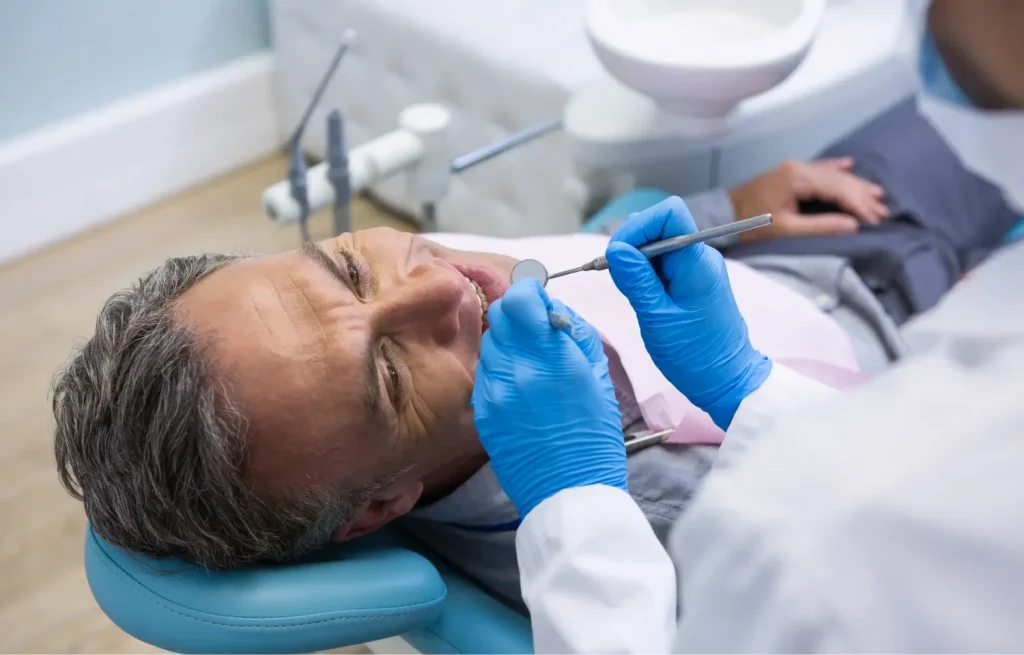Does Medicare Cover Dental Services? Your Guide to Coverage
15 Nov 2024
Are you wondering if Medicare will cover your dental services? This is a common concern for many, with nearly 65% of Medicare beneficiaries lacking routine dental coverage.
Understanding which dental services Medicare covers—and what it doesn’t—can help you make informed decisions about your healthcare needs.
Medicare has limitations regarding dental coverage. While it may cover medically necessary dental services, such as those related to head and neck cancer treatments, routine dental services like cleanings, fillings, and tooth extractions are typically excluded.
Knowing these gaps is crucial to ensuring you get the care you need.
What is Medicare and How Does it Work?
Medicare is a federal health insurance program primarily covering medical services for people aged 65 and older and certain younger individuals with disabilities. It helps pay for various medical treatments, but dental services are often excluded from this coverage.
There are two main options: Original Medicare, which includes Part A (hospital insurance) and Part B (medical insurance), and Medicare Advantage plans, often providing additional benefits like dental care.
While Medicare beneficiaries receive coverage for medically necessary treatments, routine dental treatment typically falls outside this scope.
Does Medicare Cover Dental Services?

Medicare generally covers medically necessary services, but dental care is often excluded. Here’s what you need to know:
Medicare Covered Services
Under Original Medicare (Part A and B), dental care like cleanings, tooth extractions, and fluoride treatments are not typically covered. However, medically necessary dental procedures, such as those required before surgery or linked to inpatient hospital services, may be included.
Exceptions for Dental Coverage
Most dental services are only included if they are part of a more significant medical procedure. For instance, Medicare might cover dental work required for conditions like head and neck cancer treatments. Routine dental services remain uncovered, and additional plans like Medicare Advantage or stand-alone dental insurance may be needed for comprehensive care.
Medicare covers some medically necessary dental services, but routine dental care is usually excluded. Consider additional options like Medicare Advantage or private insurance plans for comprehensive coverage.
What Dental Services Does Medicare Cover?
Medicare generally doesn’t cover routine dental care, but there are exceptions when dental services are considered medically necessary. Here are key scenarios where Medicare may offer coverage:
- Oral examinations: Covered before major surgeries, such as heart surgery or head and neck cancer treatments.
- Tooth extractions: Required for jaw fractures, infection control, or preparing for medical treatments.
- Oral complications: Medicare may cover treatments related to oral complications from radiation therapy or T-cell therapy.
- Dental splints: Provided for injuries to the head and neck that require stabilization.
- Inpatient hospital care: Coverage may apply if dental issues arise due to an underlying medical condition and require hospital admission.
While Medicare doesn’t typically cover routine dental care, it does offer coverage for medically necessary procedures, especially when they relate to more significant medical conditions. Beneficiaries should explore other insurance options or Medicare Advantage plans for routine care.

Medicare Advantage Plans and Dental Coverage
Medicare Advantage plans provide an alternative to Original Medicare, offering additional benefits, including dental coverage.
Many Medicare Advantage plans (offered through private insurance companies) include dental services that Original Medicare doesn’t cover.
These plans may cover:
- Oral examinations, routine cleanings, and root canals.
- Routine dental services like fillings and tooth extractions.
Medicare Advantage plans typically require a monthly premium, which varies by provider. Medicare pays a portion of the costs for covered services, with beneficiaries responsible for any out-of-pocket expenses, such as copayments and deductibles.
Medicare Advantage plans are a great option if you need dental coverage beyond what Original Medicare offers. However, it’s important to understand the costs and coverage details before choosing a plan.
Costs and Considerations for Medicare Dental Services
When planning for dental care under Medicare, it’s essential to understand potential costs and available coverage options.
Out-of-Pocket Costs with Original Medicare
Original Medicare generally does not cover routine dental services like cleanings or fillings. This means you’ll likely face out-of-pocket expenses for these treatment services.
Medically necessary dental care tied to other treatments, such as jaw fractures or cancer-related surgeries, may be covered, but routine services are excluded.
Medicare Advantage and Dental Insurance Costs
Many Medicare Advantage plans offer additional dental benefits, including oral examinations, root canals, and preventive care.
These plans typically have monthly premiums, which vary depending on the provider and coverage level. While Medicare will pay a portion of these covered services, beneficiaries may still be responsible for copayments and deductibles.
Reducing Out-of-Pocket Costs
To reduce costs, consider exploring:
- Standalone dental plans from private insurance providers.
- Medicare Advantage plans that offer robust dental coverage. These options can help minimize the financial burden of routine and major dental care.
Understanding the costs associated with dental care under Medicare is crucial. Exploring Medicare Advantage plans and dental insurance can help reduce out-of-pocket expenses and ensure you receive the necessary dental care.
What to Do If You Need Dental Coverage

If you’re seeking dental coverage beyond what Original Medicare offers, there are a few essential steps you can take to ensure you get the care you need.
Compare Medicare Advantage Plans
Start by comparing different Medicare Advantage plans that include dental benefits. Look for plans that cover the specific dental services you need, such as cleanings, oral exams, or root canals. Review the plan’s monthly premiums, deductibles, and out-of-pocket costs to determine the most cost-effective option.
Explore Private Dental Plans
Consider private dental insurance if Medicare Advantage plans don’t meet your needs. Many private insurers offer standalone dental plans that cover routine services, preventive care, and more extensive procedures like tooth extractions or crowns.
Consult with Dental Professionals
Speak with your dental provider to understand which services are essential based on your clinical status. They can help you prioritize care and recommend treatment plans that align with your health needs.
Get a Comprehensive Workup
Before undergoing major medical treatment (such as surgery or cancer treatment), ensure you receive a comprehensive oral health workup. This will help prevent potential dental complications and ensure that your overall health plan is well-coordinated.
To secure dental coverage, compare Medicare Advantage and private dental plans. Consult with dental professionals to prioritize necessary services and proactively manage your oral health before major medical treatments.
Final Thoughts
Medicare has significant limitations regarding routine dental services like cleanings, fillings, and extractions. While some medically necessary procedures are covered, most routine care falls outside Original Medicare’s scope.
It is important to explore Medicare Advantage plans or standalone private insurance plans offering broader coverage to ensure you receive comprehensive dental care.
These options can help you access preventive and essential services that Medicare does not provide.
For personalized care, visit Greenspoint Dental and ensure your dental health is covered.
FAQs: Medicare and Dental Services
Does Medicare cover routine dental services?
No, Original Medicare generally does not cover routine dental services such as cleanings, fillings, or tooth extractions. However, it may cover medically necessary dental treatments if they are part of a broader medical procedure, such as dental work required before surgery or treatment for head and neck cancer.
What types of dental care are covered by Medicare Advantage?
Medicare Advantage plans often include dental coverage for preventive services like cleanings and exams, and major dental care such as root canals and tooth extractions. Coverage and costs will vary depending on the specific plan.
Can I receive dental services related to oral cancer or head and neck cancer?
Yes, Medicare covers dental services related to oral or head and neck cancer treatments, especially if the dental work is medically necessary for your overall treatment plan. This may include dental procedures required before or after radiation therapy or surgery.
How do I address dental complications from medical conditions?
Medicare may cover dental services required to address complications from underlying medical conditions, such as end-stage renal disease or complications arising from chemotherapy or radiation treatment. Dental care is considered necessary for managing the medical condition in these cases.
For more detailed and personalized advice, consult a healthcare provider or visit Greenspoint Dental.
Related Blog Articles